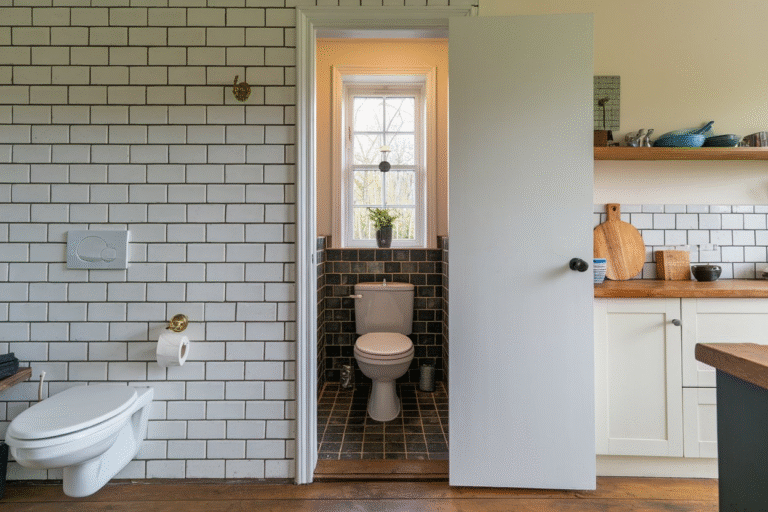Can a Bedroom Be Next to A Kitchen?

Can a bedroom be next to a kitchen? The short answer is yes, but there are some other factors to consider.
When planning the layout of your home, you may come across a few odd spaces that you’re not sure what to do with.
One of the most common odd configurations is having a bedroom next to a kitchen.
This may seem like an odd layout, but it’s actually quite practical and can be a great use of space.
A bedroom next to a kitchen can be a great way to maximize the space in your home and create a functional layout.
Can a Bedroom Be Next to A Kitchen
Yes, a bedroom can be next to a kitchen. It’s not uncommon for bedrooms to be located near a kitchen, especially in smaller homes, apartments, and condos.
However, there are a few things to consider to ensure that the bedroom and kitchen can coexist peacefully.
For example, you should consider the bedroom’s proximity to the kitchen’s main appliances, such as the refrigerator, oven, stovetop, and dishwasher.
You’ll also want to think about the kitchen’s layout, the potential for cooking odors to waft into the bedroom, and how much foot traffic the kitchen typically sees.
How to Soundproof a Room Next to a Kitchen
If you’re planning to build a bedroom next to the kitchen, or you’re considering soundproofing a room so you can sleep in peace, here are a few things you can do to minimize the noise.
• Add insulation to the walls. This is an easy way to reduce noise from the kitchen and other rooms in your home.
• Install soundproofing drywall. This is an effective way to reduce noise from the kitchen and other rooms in your home.
• Add acoustic panels to the walls. This is an effective way to reduce noise from the kitchen and other rooms in your home.
• Add a soundproofing underlayment to the floor. This is an effective way to reduce noise from the kitchen and other rooms in your home.
• Add a soundproofing rug pad under the rug. This is an effective way to reduce noise from the kitchen and other rooms in your home.
How to Soundproof a Bedroom From a Kitchen
Soundproofing your bedroom can help you and your roommates enjoy some peace and quiet. This is especially important if you have a roommate who works the night shift, or if you’re the one who’s up late.
There are several ways to soundproof a room, from adding a door sweep to installing insulation. This guide will help you find the right soundproofing solution for your space.
1. Seal the Gaps
If you’re going to be converting a room into a bedroom, you need to make sure that any gaps in the floor, walls, or ceiling are sealed. This is important for any room, but it’s particularly important for a kitchen, where temperature control and cleanliness are top priorities.
You can use a variety of materials to seal gaps, including caulk, spray foam, and weatherstripping. You should also make sure that any holes or gaps around electrical wiring, plumbing, and ductwork are sealed.
2. Soundproof the Windows
Noise from the kitchen can easily travel through the rest of the home. To prevent this, you can soundproof the windows in the kitchen. This can help to block out noise from the kitchen, and it can also help to keep the rest of the home quiet.
To soundproof the windows, you can add a layer of soundproofing material to the window. You can also add a layer of insulation to the window, or you can add a second pane of glass to the window.
3. Soundproof the Doors
The doors are the main source of sound. If you can hear the TV in the living room or the kids playing in the family room, you can hear the kitchen sounds, too.
The best way to soundproof a door is to remove the door from the hinges and replace the door with a solid-core door. If you don’t want to replace the door, you can add mass to the door by adding a layer of MDF or plywood to the door and then adding a layer of soundproofing material.
4. Use Soundproof Blankets
Soundproof blankets are an effective and affordable soundproofing option for bedrooms, especially if you’re renting your home.
Soundproof blankets are thick, heavy blankets that absorb sound and create a barrier between rooms. You can hang soundproof blankets on the wall between your bedroom and the kitchen, or use them to cover windows and doors.
Soundproof blankets are easy to install and remove, and they’re much cheaper than building a wall or installing soundproof insulation.
5. Use Soundproof Paint
Soundproof paint is a great option for reducing noise in your bedroom, especially if you don’t want to do any major renovations.
Soundproof paint is a type of paint that contains sound-absorbing materials, which help to reduce the amount of noise that can pass through the walls.
You can apply soundproof paint to the walls of your bedroom to help reduce the noise from the kitchen.
6. Use Soundproof Curtains
Soundproof curtains are designed to block out noises from the outside, but they can also be effective at blocking out noises from inside your home, like the sounds of your kitchen.
Hang soundproof curtains on the wall that your bedroom shares with the kitchen to help muffle the sounds. You can also use soundproof curtains on your windows to help block out outside noises that may disturb your sleep.
7. Use Soundproof Rugs
Soundproof rugs are a great way to reduce noise in your bedroom, and they can also add some style to your space. These rugs are made with thick, dense materials that help to absorb sound and reduce echo.
You can place soundproof rugs under your bed or throughout your bedroom to help reduce noise from the kitchen. Rugs are especially effective at reducing noise from footsteps and other impact sounds.
8. Use Soundproof Ceiling
Soundproof ceiling is a great solution for those who don’t want to go through the hassle of replacing their existing ceiling.
The most common way to soundproof your ceiling is to add a second layer of drywall. You can also add insulation in between the two layers to help absorb sound.
Conclusion
When you are designing your home, the location of your bedroom and kitchen is important.
If you have the choice, it is best to place your bedroom and kitchen in different parts of your home.
However, you can use the tips above to make a bedroom next to a kitchen work.





